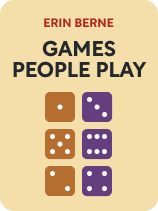

This article is an excerpt from the Shortform book guide to "Games People Play" by Eric Berne. Shortform has the world's best summaries and analyses of books you should be reading.
Like this article? Sign up for a free trial here .
Why do people play mind games on each other? Why are we so afraid of showing up authentically?
Playing mind games is a normal part of psychological development—all people do it at some point in their lives. According to Dr. Eric Berne, the author of Games People Play, we default to mind games because the more fulfilling social form—intimacy—is either unavailable or too terrifying for most people.
Here’s how to stop playing mind games and embrace sincere relationships.
Learn to Grow Past Your Games
Games People Play focuses on the games, but Berne also gestures beyond them. Games are unhealthy and, Berne says, a shallow substitute for deeper human connection. In his book Games People Play, he explains how to stop playing mind games and start showing up authentically.
After Games Comes Self-Sovereignty
Berne calls this advanced stage of personal development “autonomy,” and we’ll refer to it as self-sovereignty. It’s composed of three capacities, which together enable you to grow past game-playing. Beyond that compulsive drive, we can develop healthier connections with our emotions, understand and control our behavior, and live more fully.
| Autonomy in Psychology and Philosophy Berne isn’t the first person to emphasize the importance of autonomy—it’s been an important concept for many thinkers throughout history. In psychology, autonomy is one of self-determination theory’s core ingredients of intrinsic motivation. Edward Deci expanded earlier research, finding that autonomy, along with competence and relatedness, motivate us to do things for their own sake (intrinsic motivation). And when we lack autonomy, as when external pressures from work or relationships push on us, we tend to feel worse. In philosophy, autonomy is a controversial topic. Thinkers such as Kant and John Stuart Mill used it to denote a sort of moral self-determination, while in political philosophy it’s an essential ingredient in how we conceive of our basic rights (if we aren’t autonomous, how can we enjoy liberty?). Berne holds that autonomy is the highest form of psychological development, where you’re able to make free choices and live uninhibited by external pressures. This seems to reflect Kant, whose notion of autonomy was rational and fully self-willed. |
As we grow up, parents and culture exert a heavy influence on us. According to Berne, this inhibits our natural ability to have honest, authentic relationships. Your parents teach you labels and categories for everything and teach you “proper” behavior, while education pushes you through a standard mold.
For example, Berne argues that children perceive raw reality—young eyes see a caterpillar without filters. But when your parents teach you, “That’s called a caterpillar, and that’s a butterfly,” they cloud your direct experience of the fullness of reality. In other words, concepts and judgments distort our perception.
Berne says that most adults have lost this capacity for direct awareness and need to recover it. He outlines it and two other elements that compose “autonomy” or self-sovereignty, and argues that recovering these capacities leads to a more fulfilling experience of life.
Present Awareness
This is the capacity to live in the here and now. To be aware is to see things directly, as they truly are and not how you were taught to see them. Cultivating presence gets you into a deeper relationship with your own direct experience, and Berne argues that you’re only as alive as you are present.
For example, say you’re working at your desk on a project report. If you’re worrying about the deadline, you’ve projected your mind off into the future. You’re somewhere other than your immediate experience. Berne would say that your partial presence means you’re only partially alive, since you aren’t genuinely there. Clear, present awareness is therefore an essential ingredient of a fuller life.
| Berne’s assertion that you’re only as alive as you are present is provocative when combined with his notion of life scripts: The idea that we’re all acting out predetermined patterns, set way back in childhood. He seems to be saying that most people are hardly alive, if at all. Yet this idea isn’t without merit. The researcher Samo Burja discusses “live” versus “dead” players—in short, some people or entities (like a government) are incapable of taking novel actions, while others are capable of doing so. In Berne’s terms, scripts rule some lives, but others have figured out how to live script-free. From a neural angle, we could say that existing, myelinated habits (like games) rule dead players, while live players are capable of carving new pathways. Insofar as mindful, present awareness is a powerful tool for habit change, Berne seems to be spot-on in this prescription. |
Freedom of Choice
This is the capacity to express your genuine emotions and inclinations, uninhibited by parental and cultural conditioning. Berne calls this “spontaneity.” It means making the choices that are true to you, no longer doing what others think you should. When you break free of inherited ways of thinking, feeling, and acting, genuine self-expression becomes possible.
Consider the common phenomenon of corporate workers who realize, 20 years into their careers, that they never really wanted to do this. They wanted to write, or paint, or sail, or start their own business. Yet so many of us walk the “normal” paths because of how strongly culture conditions us. Breaking free of this, Berne argues, is a crucial step toward real self-sovereignty.
| Many of us in fact struggle with genuine self-expression, as Berne suggests. Yet according to positive psychology, it’s a critical aspect of personal development: Learning to express yourself authentically helps you to develop a well individuated personality, and learn about your own mind and values. And at the same time, self-inhibition has been linked to addiction: An addiction develops when you suppress a need, like for a more intimate time with your partner, and replace that void with an easy, gratifying action, like binge eating or drug use. Berne’s stance is similar: Suppressing genuine self-expression perpetuates your games and, since games are positive feedback loops, this is almost a behavioral addiction. |
Sincere Connection
This is the capacity to show up authentically in our relationships. Deeper, fuller connection becomes possible when you’re present and uninhibited. Berne calls this “intimacy,” and he believes that it’s the most rewarding form of interaction.
He argues that when you’re sincere, open, and present with someone, you’ll naturally feel affection toward them. Think of the raw, intimate experience of looking deeply into your partner’s eyes. Showing up like this, we make ourselves vulnerable. But when there are no games left to hide behind, a deeper, fuller connection starts to bloom.
| Berne characterizes intimacy as “the most perfect form of human living.” This sounds like Abraham Maslow’s notion of peak experiences, wherein you are fully, transcendentally immersed in the present moment. Yet it’s different in one key way: peak experiences are often yours alone, while intimacy requires another person. Our individualistic culture typically focuses on personal achievement (we revere personal development, and hardly think of collective development). ART International corroborates Berne’s view, having trained thousands to find more fulfilling relationships through authentic relating: A communication modality characterized by sincere self-expression and intimate connection—which Berne also held to be important. So, the idea that perfect living lies in relationship isn’t so far-fetched—we are social animals, after all. |

———End of Preview———
Like what you just read? Read the rest of the world's best book summary and analysis of Eric Berne's "Games People Play" at Shortform .
Here's what you'll find in our full Games People Play summary :
- The many ways that we relate to one another through “games”
- Why you might be missing out on the fulfillment of game-free living
- How to identify and overcome unhealthy games






